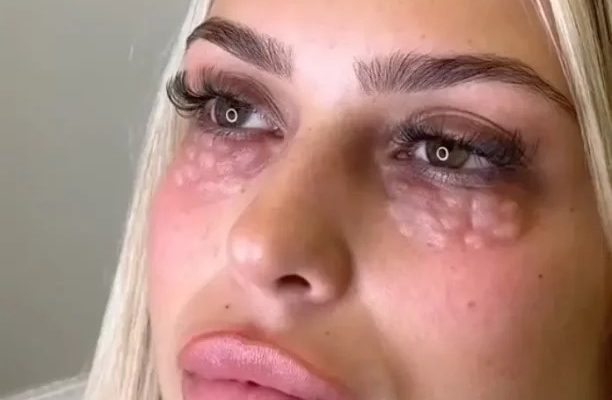Doctor Warns Against Dangerous New Trend That Leaves People Looking Like ‘Reptiles’…. Read full story in comment👇
A decades-old cosmetic procedure has resurfaced, sparking concerns among medical professionals.
Known as mesotherapy, this technique involves injecting a mixture of vitamins and minerals beneath the skin using fine needles.
It is marketed as a way to smooth wrinkles, reduce fat, and eliminate under-eye bags, per Neo Health Clinic.
Initially developed in France in 1952 to address vascular and immune disorders, mesotherapy has evolved into a popular aesthetic treatment, gaining traction in the United States.
The procedure can be performed on various areas of the body, including the stomach and hands, though it is most commonly used under the eyes.

However, the procedure comes with temporary side effects, including small, raised bumps on the skin immediately after injection, creating a ‘honeycomb-like’ texture.
Some individuals even describe the appearance as ‘reptilian.’
While these effects generally fade, doctors caution that the risks far outweigh the benefits in many cases.
Dr. Viktoryia Kazlouskaya, a dermatologist based in New York, expressed serious concerns to Mail Online: “The risks of under-eye mesotherapy go beyond minor side effects, especially when people go to inexperienced technicians or do this at home.
“Patients may experience long-lasting bruising, severe allergic reactions, skin necrosis due to product placement in blood vessels, or even permanent eye damage.”

An additional risk arises from the lack of standardization in the substances used. Unlike FDA-regulated treatments such as Botox, mesotherapy formulas are often unique to each practitioner and may include unverified or counterfeit products.
Dr. Kazlouskaya added: “While mesotherapy may be legal in some other countries, the absence of US regulatory oversight means patients could be exposed to counterfeit or unverified products.”
Mesotherapy involves injecting a blend of vitamins, enzymes, hormones, and other nutrients under the skin.
Some formulations even include prescription medications such as antibiotics or vasodilators.
Companies sell mesotherapy solutions online for prices ranging from $45 to $349, making it an accessible but potentially risky option.
Dr. Tripathi, a California-based plastic surgeon, highlighted how the simplicity of the technique has contributed to its widespread use: “It’s cheap, easy to do, and takes little training to perform.” Social media platforms, especially TikTok, have fueled the trend, with some users attempting the procedure on themselves.
“However, inexperience can lead to complications, such as granulomas (immune reactions forming lumps under the skin), infections, or scarring.”

Despite its growing popularity, the FDA has not approved mesotherapy blends for facial use.
While individual ingredients might be FDA-approved, there’s no regulation of the complete formulas.
Dr. Tripathi likened this to the unregulated supplement industry: “Just like the multi-billion dollar supplement industry, it’s not regulated, so you sometimes may not know what you’re getting.”
Under-eye issues vary widely based on individual anatomy and underlying causes, such as fat migration, pigmentation, or thinning skin.
Dr. Tripathi explained that the most effective treatments depend on the specific problem.
For example, pigmentation issues might be improved with skincare products or plasma injections, while thin, wrinkled skin could benefit from laser treatments.
In cases of fat migration causing puffiness, surgery such as blepharoplasty may be necessary.
Although mesotherapy may theoretically help with hollowing under the eyes, studies have yet to confirm its effectiveness.
Dr. Hannah Kopelman, a New York dermatologist, stressed the importance of identifying the root cause before pursuing any treatment: “As a dermatologist, I always emphasize the importance of a tailored approach to addressing dark circles, starting with identifying the underlying cause and exploring evidence-based options that provide safe and predictable results.”

